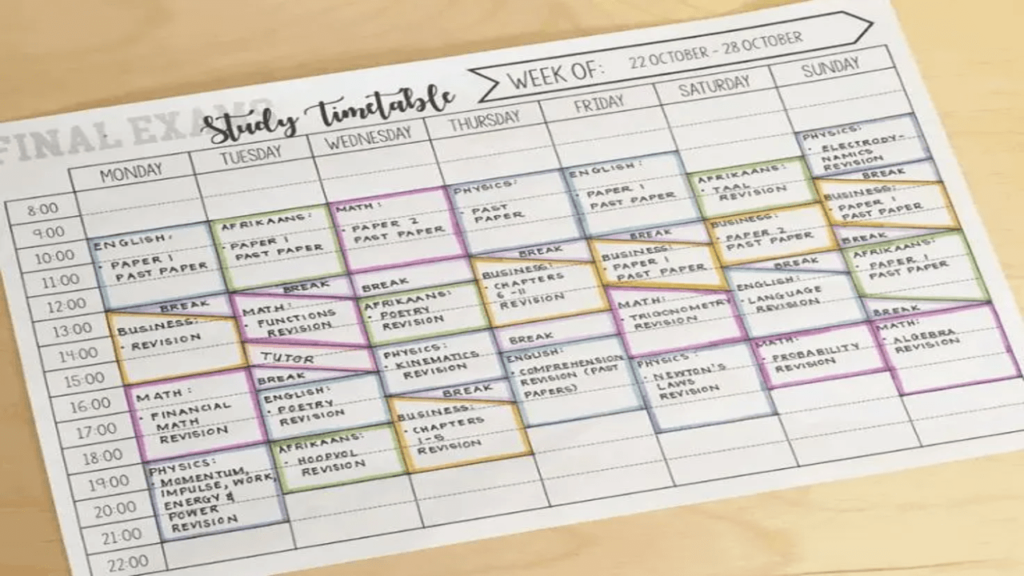Preparing for exams or managing schoolwork can often be overwhelming. However, creating an effective study plan can significantly improve your ability to understand and retain information, leading to better success results. A study plan is a personalized schedule that outlines what you need to study and when. It helps you manage your time efficiently and reduces stress by breaking down your study materials into manageable segments. In this guide, we will walk you through the steps to prepare an effective study plan that aligns with your academic goals.
Understanding Your Learning Style:
The first step in creating an effective study plan is understanding your learning style. Everyone absorbs information differently, so it’s important to figure out whether you are a visual, auditory, kinesthetic, or reading/writing learner. This will help you tailor your study methods to fit your preferences, making your study time more productive.
Setting Clear Goals:
Before you start planning, set clear, achievable goals. Determine what you want to accomplish with your study plan, such as improving your grades in a specific subject or preparing for an upcoming exam. Ensure your goals are Specific, Measurable, Achievable, Relevant, and Time-bound (SMART). This clarity will guide your study plan and keep you focused.
Assessing Your Current Schedule:
To incorporate your study plan effectively into your life, assess your current schedule. Identify your commitments, such as school, work, and personal activities. Understanding your available time will help you allocate study sessions realistically and avoid over-committing.
Creating Your Study Plan:
Now that you have identified your goals and available time, start creating your study plan. Here’s how:
- Break down your study materials: Divide your subjects into topics and subtopics. This makes the study material more manageable and helps you focus on one area at a time.
- Allocate time blocks: Based on your current schedule, allocate specific time blocks for studying each topic. Remember to factor in breaks and revision time.
- Be flexible: While consistency is key, your study plan should also be flexible. Allow for adjustments based on your progress and any unforeseen events.
- Incorporate review sessions: Regular review sessions are crucial for retention. Schedule short review sessions daily and longer ones weekly to reinforce your learning.
Effective Study Techniques:
Incorporating effective study techniques into your study plan can enhance your learning. Some techniques include:
- Active recall: Instead of passively rereading notes, practice recalling the information from memory. This strengthens your memory and understanding.
- Spaced repetition: Reviewing information over increasing intervals helps to improve long-term retention.
- Practice tests: Taking practice tests can help you familiarize yourself with the format of the exam and identify areas that need improvement.
- Pomodoro Technique: This involves studying for 25 minutes followed by a 5-minute break. It helps maintain focus and productivity.
Crack SSC CGL with Majestic Academy’s expert coaching – unlock your potential and achieve success in your dream government job.
Time Management Tips:
Effective time management is essential for a successful study plan. Here are some tips:
- Prioritize tasks: Focus on more important or challenging topics first.
- Avoid multitasking: Concentrate on one subject or task at a time to improve efficiency and retention.
- Set time limits: Assign specific periods to study sessions to maintain focus and avoid burnout.
- Use tools: Utilize planners, calendars, or apps to keep track of your study plan and deadlines.
Staying Motivated:
Maintaining motivation is crucial for sticking to your study plan. Here are some strategies:
- Set small, achievable targets: Meeting smaller goals can boost your confidence and motivation.
- Reward yourself: Reward yourself for achieving study goals or completing sessions.
- Study with peers: Group study can increase motivation and help clarify doubts.
- Stay positive: Maintain a positive attitude towards your studies and believe in your ability to succeed.
Monitoring and Adjusting Your Study Plan:
Regularly monitor your progress and adjust your study plan as needed. Assess what’s working and what isn’t, and make changes to improve your efficiency. Remember, the goal is to find a study plan that best suits your learning style and schedule.
Explore Majestic Academy’s CAT Coaching or opt for the flexibility of CAT Online Coaching to boost your preparation!
To Conclude
An effective study plan is a powerful tool for achieving academic success. By understanding your learning style, setting clear goals, managing your time efficiently, and incorporating effective study techniques, you can maximize your learning potential. Remember, the key to a successful study plan is flexibility, regular review, and self-motivation. Start planning today and take control of your academic future!
Take control of your academic future with Majestic Academy – enroll now and create a personalized study plan for success!

